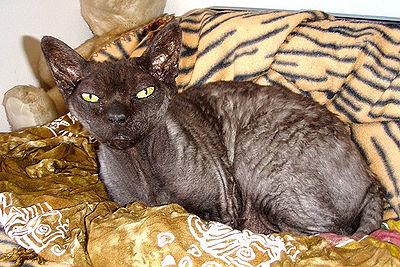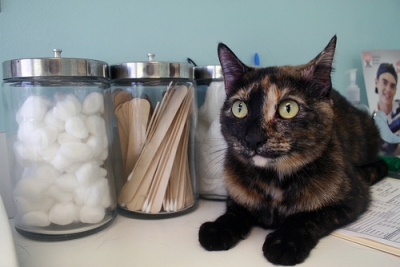
Every animal does a certain amount of scratching and licking, but when it becomes excessive, it’s time to investigate. Here are some skin disorders you may encounter with your cat.
Ringworm is caused by a parasitic fungus. It spreads through direct contact with an infected cat or objects that come in contact with the infected cat. It is highly contagious to humans as well as other animals. Ringworm appears as a round patch, red-ringed with hair loss in the center. It should be treated by a veterinarian. Home and furnishings should be thoroughly cleaned and disinfected.
Flea Allergy Dermatitis – Some cats can be allergic to flea bites. The bites produce small reddish patches. Crusted pimples can develop. There are spot-on products available for cats as well as natural and homeopathic treatments to eliminate fleas.
Food Allergy Dermatits – These allergies are usually caused by corn, wheat or soy in commercial cat foods. Cats are mainly carnivores, so check cat food labels to be sure the food is low or no grain and the main ingredient is meat or chicken. Or you can homecook to eliminate the problem. Check with a feline nutritionist for a balanced diet with the correct amount of supplements added.
Ear Mites live mainly on the surface of the ear canal. If your cat is scratching its ears excessively and there is brown waxy material in the ears, ask your vet to check for ear mites. Your vet will prescribe ear wash or drops to kill the mites. Excessive scratching can cause sores which may become infected.
Contact Dermatitis can be caused by detergents, insecticides, other chemicals, even the type of food dish your cat eats out of such as plastic. An itchy rash develops. You can find and remove the irritant by the process of elimination. Your vet will supply the necessary medication to clear up the rash.
Sunburn – Care must be taken with hairless cats or cats with light or white colored fur on sunny days, especially during the hours 10 a.m. – 2 p.m. These cats are especially at risk for sunburn and can develop skin cancer.
Always consult with your veterinarian if you suspect that your cat has a skin problem and before beginning any treatment so that it can be correctly diagnosed and treated.
Related Articles


